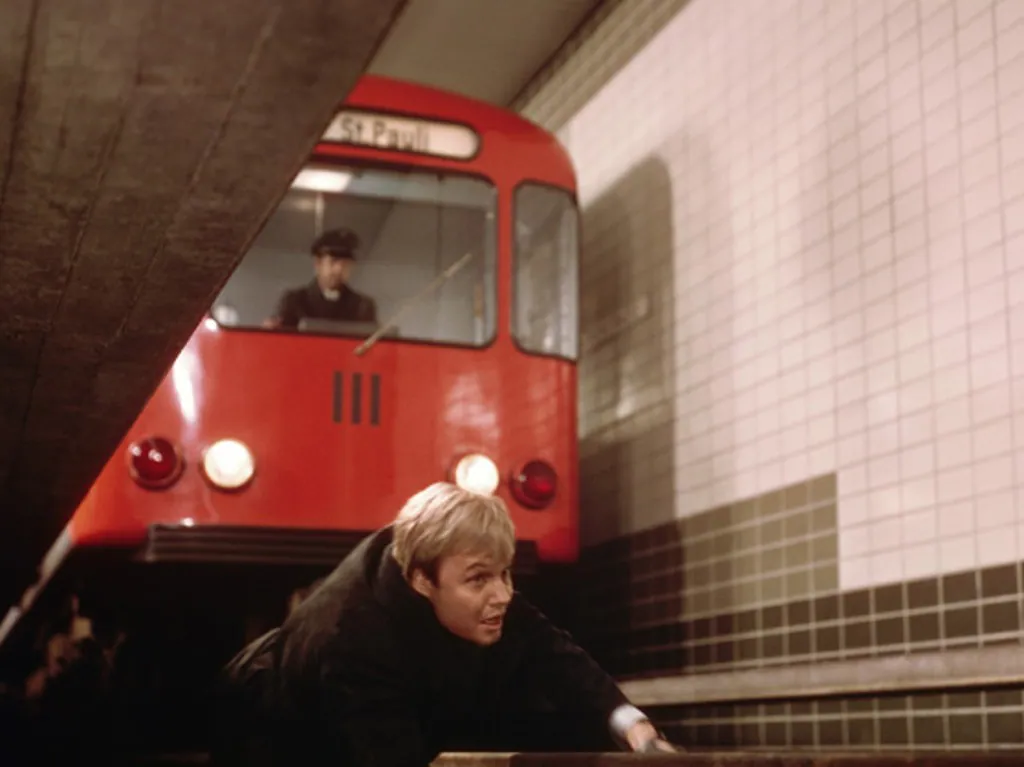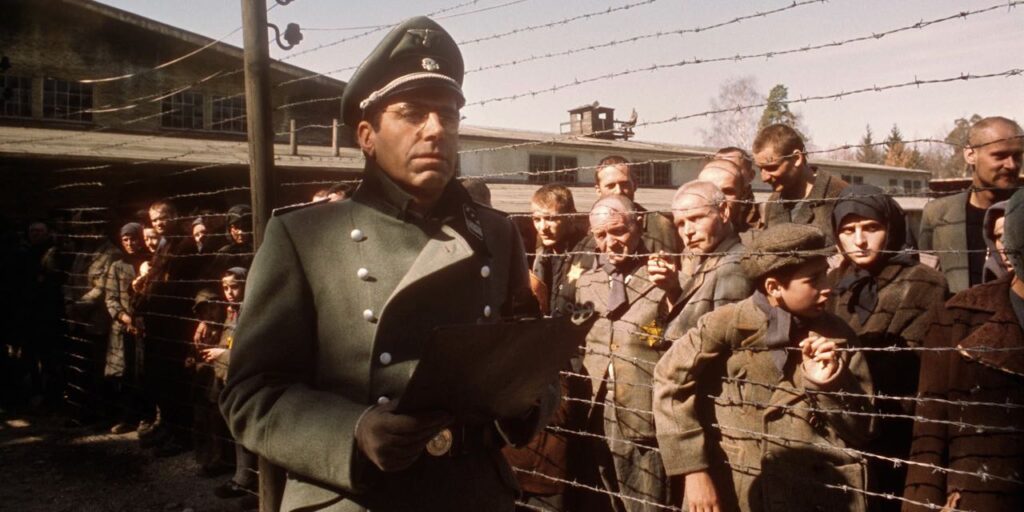The Odessa File (1974)

DIRECTOR: Ronald Neame
CAST: Jon Voight, Maximilian Schell, Mary Tamm, Maria Schell, Derek Jacobi
REVIEW:
The Odessa File follows 1973’s The Day of the Jackal as another adaptation of one of Frederick Forsyth’s international thrillers (like the previous film, The Odessa File is based on Forsyth’s best-selling novel of the same name), and while it’s not up to its predecessor’s level when it comes to potboiler intrigue (though really neither was its source material), it’s a sporadically effective little 1970s thriller that occasionally feels a little dated and silly but also features some effective moments and some interesting underlying themes.
In 1963 Hamburg, young German investigative journalist Peter Miller (Jon Voight) has just stopped on the curb to listen to the radio announcement of President Kennedy’s assassination when an ambulance speeds by. Being the wily reporter that he is, Peter follows and finds a suicide, an elderly Jew named Salomon Tauber. Among Tauber’s few possessions is an old diary which turns out to be a record of the ordeal of Tauber and his wife in the Riga concentration camp during WWII. For reasons which are not revealed until the climax, Peter becomes obsessed with locating the sadistic SS Captain mentioned in the diary, Eduard Roschmann (Maximilian Schell), against the advice of his live-in girlfriend Sigi (Mary Tamm), his mother (Maria Schell), and his police chief friend (Gunnar Moeller). As Peter delves more deeply into the mysterious disappearance of Roschmann, he uncovers an entire underground organization—-Odessa—-using powerful connections to protect Nazi war criminals, and puts himself and possibly those around him in increasing danger in his dogged search for the truth. Eventually he crosses paths with Israeli intelligence agent David Porath (Peter Jeffrey), who has come to Germany to thwart a secret bioweapons plan by Odessa to destroy Israel, and the reporter becomes entangled in the Israeli operation to infiltrate the Odessa hierarchy.
Among film adaptations of Frederick Forsyth’s international espionage novels, The Odessa File is not up to the same level as The Day of the Jackal. Then again, it’s a mostly faithful adaptation of the book, which isn’t up to the same level either, so that’s probably inevitable (The Day of the Jackal is generally rightfully regarded as Forsyth’s magnum opus). The Odessa File wants to be a twisty-turny potboiler, but it’s not as tightly or logically written, and there’s times when this random reporter bumbling around getting involved in infiltrating secret organizations and getting mixed up with Israeli intelligence (!) gets a little silly (exactly why would Israeli intelligence agents want to recruit a random civilian for such a high-stakes operation?). As our “hero”, Peter is occasionally a little lacking; someone who commits his series of amateurish actions should by rights have gotten himself killed several times over. Even with a (not entirely effectual) age makeup job and a graying mustache, baby-faced Jon Voight infiltrating a den of ex-Nazis isn’t entirely convincing, nor is his battle to the death with an Odessa assassin in a factory. The occasional corniness certainly isn’t done any favors by the sometimes over-the-top, painfully dated 1970s score by Andrew Lloyd Webber of all people, which hopelessly dates the movie and makes some wannabe suspenseful scenes unintentionally semi-comical instead (The Day of the Jackal had virtually no music, and was probably the better for it, feeling less dated by comparison). This was one of only two times that Webber composed a film score (the other being 1971’s Gumshoe), and if his work here is any indication, maybe he should have stuck to Broadway. Still, Peter’s search for Roschmann through the secret world of the Odessa and his journey across Germany and Austria, meeting a line-up of shady characters along the way, is fairly intriguing, definitely benefitting from the authentic German locations. The 1960s German setting is novel enough to be at least a little interesting on its own, and it’s a nicely rare scenario and a bit of positive representation to have a movie featuring both Nazi villains and an anti-Nazi German protagonist. There’s a few suspenseful moments, especially when Peter gets pushed in front of an oncoming subway train. The black and white flashbacks of a younger Tauber and Captain Roschmann in Riga feel tame and dated compared to the likes of Schindler’s List (probably not a fair comparison), but they serve their purpose adequately enough.

Adding a little weight to the proceedings is the fact that, while Peter Miller and the specific story here is fictional, there really was a secret organization known as the Odessa, created by former SS officers to protect Nazi fugitives, and Eduard Roschmann himself was a real person who was found murdered in South America after the release of the book and movie, allegedly by Odessa itself to stop the unwanted publicity. In addition to Roschmann, Peter also pays a visit to another real-life figure, the famous Holocaust survivor and Nazi hunter Simon Wiesenthal (credible lookalike Shmuel Rodensky); the real Wiesenthal served as a technical adviser for the film. The movie also touches on some complex and weighty issues, although they mostly remain subtext, including the splintered German psyche regarding WWII and how the post-war 1960s Germany is torn between wishing to sweep an unsavory past under the rug while at the same time feeling obligated to aid Israel in its time of need. The book went more substantially into some of these issues, including debating the notion of “collective guilt” and drawing a distinction between “normal” German soldiers who fought for their country and sadistic murderers like Roschmann, but touching on them, albeit shallowly, here gives a film a little extra depth.

Jon Voight, despite his occasional hammy loud-talking tendencies (one might think Peter should lower the volume when discussing a secret Nazi society in public), is for the most part a serviceable leading man as the determined Peter, and he holds his own in the eleventh hour when he finally comes face to face with a forceful Maximilian Schell. Mary Tamm is adequate, but her role is limited to the supportive/worried girlfriend. Voight and Tamm both worked diligently with dialect coaches to adopt North German accents authentic to Hamburg, and Voight at least keeps his light and subdued and avoids the frequent tendency of actors attempting German accents to overdo it. Maria Schell—-cast as Voight’s mother despite only being eight years older—-gives a convincing monologue recalling Allied bombings (incidentally, this is the only time siblings Maria and Maximilian Schell ever appeared in the same movie, though never together). Derek Jacobi (who also appeared in The Day of the Jackal) has a small but believable role as a jittery identity forger. Most of the rest of the supporting cast is made up of native German actors, including the menacing but underused Klaus Loewitsch as an Odessa hitman, Hannes Messemer and Kurt Meisel as Odessa bigwigs, and Noel Willman, Ernst Schroeder, and Til Kiwe as three former SS officers whom Peter must slip past on the way to Roschmann (Willman is particularly ominous). The scariest “Nazi” onhand is uber-creep Gunter Meisner (Mr. Slugworth in Willy Wonka and the Chocolate Factory, and a string of sinister Nazis in WWII films) as the guest speaker at an underground Nazi rally Peter sneaks into. Speaking of Roschmann, Maximilian Schell delivers easily the strongest performance in the movie despite not showing up—-apart from a couple flashbacks—-until the climax and his total screentime consisting of about twelve minutes. When he finally appears in the present, Schell delivers essentially a forceful monologue with passion and conviction as a fanatical, remorseless Nazi fugitive who attempts to justify his past crimes, laments that young Germans “don’t want to understand”, and tries to persuade Peter of the glories of Nazi Germany. He doesn’t have a lot of screentime, but he makes an impression. Our hero and villain’s final confrontation mostly consisting of a verbal argument instead of a fistfight or a shootout (although some shots get fired before the end credits) might strike some viewers as anti-climactic or underwhelming, but I actually prefer a weighty actor versus actor dialogue-driven confrontation like this to a more generic action movie climax.
At the bottom line, anyone seeking out The Odessa File hoping for another international espionage thriller on the level of The Day of the Jackal might be disappointed. It’s not as sharply or tightly written, and it’s no great classic thriller, but there are enough effective moments and interesting themes here to make it at least worth a curious look.
* * 1/2